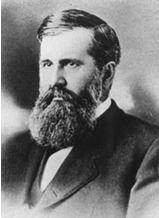Samuel Hitt Elbert
- Territorial Governor of Colorado from 1873-1874
- Party: Republican
View a description of holdings held at the Archives
Biography
Appointed Territorial Governor
Early Years
Samuel Hitt Elbert, sixth governor of the Territory of Colorado 1873-1874, was born in Logan County, Ohio on April 3, 1833. At age seven Elbert and his family moved to Iowa, where he attended public school and studied agriculture. After graduating Ohio Wesleyan University with high honors in 1854, Elbert moved to Nebraska to start a law practice. By May 1860 he had attained a good enough reputation to warrant an invitation to the Republican National Convention in Chicago that nominated Abraham Lincoln for President. It was at this convention that Elbert became associated with Lincoln, and friends with future Colorado governor, Dr. John Evans. The next year Elbert was elected to the Nebraska Legislature, although his term of office was cut short by a federal appointment.
Territorial Secretary
When Dr. John Evans received the appointment as Colorado Territorial Governor, Elbert jumped on his coattails and obtained the post of Territorial Secretary. During Evans' many trips to Washington, Elbert was required to perform the executive's duties. During one of these periods Elbert mobilized the Second and Third Colorado Volunteer regiments in order to protect Colorado against the Confederacy as well as the Indians who were uprising during the winter of 1865. Elbert also delivered the Executive Legislative Message to the Fourth Session of the Territorial Legislature and coped well with the tragic events surrounding President Lincoln's assassination. In June of 1865 Evans lost his post due to his handling of the events surrounding the massacre of Indians at Sand Creek by the Colorado Volunteers. Evans did gain a son-in-law, however, when Elbert married his daughter, Josephine.
Rise to Political Power
Even though Evans was replaced in favor of Alexander Cummings, Elbert continued on as Territorial Secretary. It was during the Cummings administration that Elbert began vying for power by attempting to discredit his competitor's claims of authority. This mud-slinging behavior backfired, however, causing him to lose his federal post. Elbert reentered politics in 1868 when he was elected to the Territorial Legislature. In 1870 he was elected Secretary, and in 1872 Chairman of the Republican Territorial Central Committee. Elbert is also credited with the creation of the Colorado Republican Party.
Appointed Territorial Governor
When the Colorado people successfully petitioned to oust Governor McCook, President Ulysses S. Grant appointed Samuel Hutt Elbert in his stead on April 4, 1873. His first act as governor was to tend to the arrival of President Grant and his family to the Territory. President Grant stayed at Elbert's home, visited Central City, and met with an association of Ute leaders. It was this meeting and others that helped to create a treaty with the Utes in September of 1873 that opened more than three million acres of the Indian reservation to mining and railroad activity. Elbert was also an advocate for irrigation in the West, and as such, founded the Western Irrigation Conference in the summer of 1873. Despite his popularity as governor and patronage of President Grant, Elbert was removed from office without explanation after less than a year.
Chief Justice
After this political defeat Elbert went to Europe for a period of two years. He was welcomed back with a nomination to the Supreme Court bench in Colorado, an office he held for more than a decade. Judge Elbert was promoted to Chief Justice of the Supreme Court of Colorado in 1880 but left state service in 1889 due to illness.
Territorial Secretary, Governor, Congressman, Judge, and Chief Justice Samuel Hutt Elbert ended a life dedicated to civil service on November 27, 1899.
To Request a Record
To search our records, please see Archives Search.
To request a record from the Archives, please submit a formal request.
- See also our associated fees
